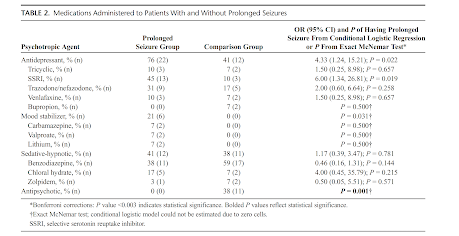Prolonged Seizures in ECT: "New" Study in JECT
Out on PubMed, in JECT, is this study:
A Retrospective Matched Comparison Study of Prolonged Seizures in ECT.
J ECT. 2023 Jul 20. doi: 10.1097/YCT.0000000000000951. Online ahead of print.PMID: 37530874
The abstract is copied below:
Objective: This study assessed the incidence of and risk factors for prolonged seizures (>180 sec) in electroconvulsive therapy (ECT).
Method: In 611 adult patients undergoing 6697 ECT treatments administered over a 2.5-year study period, 29 individuals experienced 42 prolonged seizures. A comparison sample (n = 29) was matched on sex, age, and treatment, and compared on psychiatric and medical diagnoses, as well as current medications. To examine the association between the characteristics and prolonged seizure, conditional logistic regression models or exact McNemar tests were conducted.
Results: Prolonged seizures occurred on average in 1 of every 167 treatments. No specific psychiatric disorders or medical conditions were associated with the prolonged seizure group. Antipsychotic drugs were used in a higher proportion of the comparison group than in the prolonged seizure group, suggesting a protective effect. Atropine was used in a lower proportion of the long seizure group than in the comparison group. No untoward sequelae occurred, and no progression to status epilepticus was observed.
Conclusions: Prolonged seizures appear to be an uncommon complication of ECT in adults. The characteristics examined in this study suggest limited association of psychotropic medications with prolonged seizures. Treatment of prolonged seizures was straightforward. Prolonged seizures had no impact on the course of treatment. Further exploration of prolonged seizures would enhance the generalizability of the findings from this single site study.
The paper is here.
And from the text:
Here is a helpful little study about the occurrence of prolonged seizures. Take home points are that they are uncommon (not rare) and almost always easily managed with additional induction agent (in this case methohexital, but propofol will serve, as well).
Interestingly, these data, just published, are from the mid 1990s; it would be interesting to see how they compare to current practice, with greater use of UBP stimuli.
And of course, the definition of "prolonged" used here is 180 seconds. I have always advocated for a definition of 120 seconds, believing that nothing good comes from seizure activity longer than about 60 seconds...
Oh, and let's remember that prolonged seizures are more likely in young patients.
Kudos to Keith Isenberg and colleagues for digging out these old data and putting them into the literature.





Comments
Post a Comment